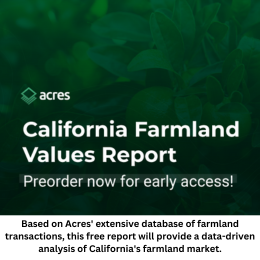January 3, 2020
By Michelle Pelletier Marshall, GAI Media
Australia’s Laguna Bay, a full service institutional investment management firm specialising in the agri sector, made headlines in December 2019 when it sold, on behalf of its investors, the largest almond portfolio in Australia to Canadian pension fund giant Public Sector Pension Investment Board (PSP Investments) for over A$350 million (~US$240 million).
The deal is a testament to Laguna Bay’s ability to serve institutional investors globally, and is significant for the industry. Laguna founder and CEO Tim McGavin highlighted it as an example of how agri assets can produce both very strong cash flows and capital growth for investors when structured well.
In addition to the almond portfolio, Laguna Bay, founded in 2010, is nearing full deployment of its $300 million-plus Agricultural Fund 1, comprising significant dairy, livestock/cropping, and vineyard assets across Tasmania, Victoria, and WA.
McGavin, a third-generation farmer from Western Queensland, is one of only a few MBA agriculturalists in the asset management industry, which helps explain his deep understanding of farming across many agricultural sectors as well as the requirements of institutional investors.
GAI News sat down with McGavin for a more detailed look at the recent transaction, its current deployment strategy and next capital raise, and a view inside the opportunities in Australian agriculture.
1.) Acting as trustee of Adveq Almond Trust 2 (AAT2), can you explain more on your firm’s due diligence process in originating and selling the almond orchard portfolio? What made this deal work?
We have a long history with the Riverland/Sunraysia region where the almond orchards are located, dating back to 1995 when my brother Rob and I owned and developed permanent crops in the area. Olam purchased the almond assets during the Timbercorp collapse in the financial crisis in 2009 and the olive company that we are invested in purchased the adjoining olive grove assets. These assets share infrastructure, so we knew them very well. Short sellers released a report on Olam in late 2012 which wasn’t justified in my opinion. I approached Olam during this time to discuss acquiring the orchards. We were able to work with Olam to understand their wider business needs and together structured an off market purchase and long-term leaseback deal in early 2013, which was quite pioneering at the time. Subsequently Adveq came on board as lead investor and helped raise additional equity and close out the deal.
2.) Net cash distributions returned to shareholders during the holding period of this almond portfolio was well over one-third of the invested capital. You have said that this is a benefit of managers making the right decisions. Can you please explain this further with a focus on the importance to the sector and deal flow?
The Almond Trust will return significant multiples on invested capital over the six-year hold period, far above what is typical in agriculture. That includes significant cash distributions as well as capital growth. The actual numbers are confidential, but I can assure you they’re impressive.
Usually, cash distributions are directly correlated with the entry price. In this case, Laguna Bay negotiated an entry price which was less than half of replacement cost, making the capital gain possible. We were certainly helped along by a strong demand in the almond sector, but entry price was key to the significant returns that the investors will enjoy from this deal.
We are living in strange times. All-time low interest rates and around $15 trillion of negatively yielding sovereign credit with a lot of forced buyers. Who would have thought we would ever see this? Investors are guaranteed to lose money unless rates go even more negative, or the investor is good at timing their exit.
Perhaps this all creates good opportunity in the future, but we cannot predict that. Finding sustainable yield is getting harder for all of us and much harder again to achieve without a J curve. Our main aim is to deploy well now and ensure that we always have funds to deploy during cyclical downturns.
Agriculture is a reflective market, rising prices create more rising prices but the opposite is also true. Managers with a disciplined approach to deployment should continue to do well over time provided they have patient long term capital partners. Redemptions might be something to monitor during the next downturn.
3.) Holding fast to ESG guidelines and methods are key in this sector that is demanding more transparency. How does Laguna Bay incorporate this into its business model? What is the impact on ROI?
ESG is new in acronym only; it is certainly not new to us. Sustainability initiatives means happier, healthier, and more productive soils, animals, and personnel which is simply good business. For decades one of my personal passions has been about water and soil preservation. The land is not ours, we are but humble custodians for future generations.
ESG and all its various associated concepts are fragmented and difficult to quantify in our industry, yet are increasingly important both internally as stewards of land resources, and to investors when assessing investments in agriculture. Capturing sustainability data and contributing to positive environmental outcomes in a meaningful and measurable way is challenging and something which needs to be driven both at the industry and government policy level, not just at a corporate process/risk management level. There is some exciting work being done in this space such as the conceptualising of a “Return on Nature”. It’s encouraging to think that we may see the “RON” as a future indicator of agri success alongside ROE.
4.) The full deployment of Laguna Bay’s second fund is anticipated in 2020 – is this on track, and when might a third fund be deployed and with what target?
Right now, all of our focus is on optimising the final stages of deployment of our current fund, maximising the productivity and operation of our farm assets for the benefit of the thousands of hardworking public service workers who place their trust in us, and the orderly winding up of the almond fund.
We should come up for air sometime in 2020 and start thinking about what is next. We have a great relationship with our current fund investors and a strong sense of loyalty to them, so the first thing to do is listen to them. We have learnt a lot about different types of structures and investors over the years so fund design and cultural fit/alignment with investors is most important to us. I think the trend to open-ended funds is a good idea for this asset class, but offering liquidity in an illiquid asset class is challenging. We have seen a few examples of this recently with other funds having liquidity issues.
5.) Tim, you and the team now have a strong track record of originating large-scale agricultural deals in beef, dairy, almonds, wine grapes, and more. What key areas do you see as critical for ag investing in the next five years? What is unique to Australian ag investment opportunities?
Asset prices globally have had a strong run for a decade or so, and off the back of that we feel like it’s time for caution. There are a few sectors that feel fully or over-priced. It’s a totally different market to what it was just five or six years ago. We’re focusing mainly on investments where value can be added and progressing them with conservative debt levels and a margin of safety in the assumptions to protect from downside risk. While entry price is a big determinator of returns, great businesses with strong, reliable cash flows will prosper long term.
Australian agriculture is positioned in a unique time in history given our proximity to SE Asia and the demand disruption the world is experiencing in these markets. Australia has scale, low costs of production, a competitive advantage in many sectors, no subsidies, and very good farmers producing premium products the world wants more of. We feel that Australia is well placed to capitalise on provenance branding and also to help solve supply chain integrity issues with traceability technology.
I would say that Laguna Bay’s origination edge comes from our strong reputation and broad networks amongst the agricultural community. We are a private, staff-owned firm with long-term patient capital, so we control our own destiny. Our team has vast experience across different agricultural sectors. Farmers are smart, they usually know who the partner of choice is. Trust is the single most important thing for them.
ABOUT TIM McGAVIN
 Tim McGavin is founder and chief executive officer of Laguna Bay. Laguna Bay is an agricultural fund manager that has around $700 million of committed and managed funds in Australian agricultural spanning many sectors and operating strategies.
Tim McGavin is founder and chief executive officer of Laguna Bay. Laguna Bay is an agricultural fund manager that has around $700 million of committed and managed funds in Australian agricultural spanning many sectors and operating strategies.
~ Michelle Pelletier Marshall is managing editor for Global AgInvesting’s quarterly GAI Gazette magazine and an occasional contributor to GAI News. She can be reached at mmarshall@globalaginvesting.com.

Let GAI News inform your engagement in the agriculture sector.
GAI News provides crucial and timely news and insight to help you stay ahead of critical agricultural trends through free delivery of two weekly newsletters, Ag Investing Weekly and AgTech Intel.




